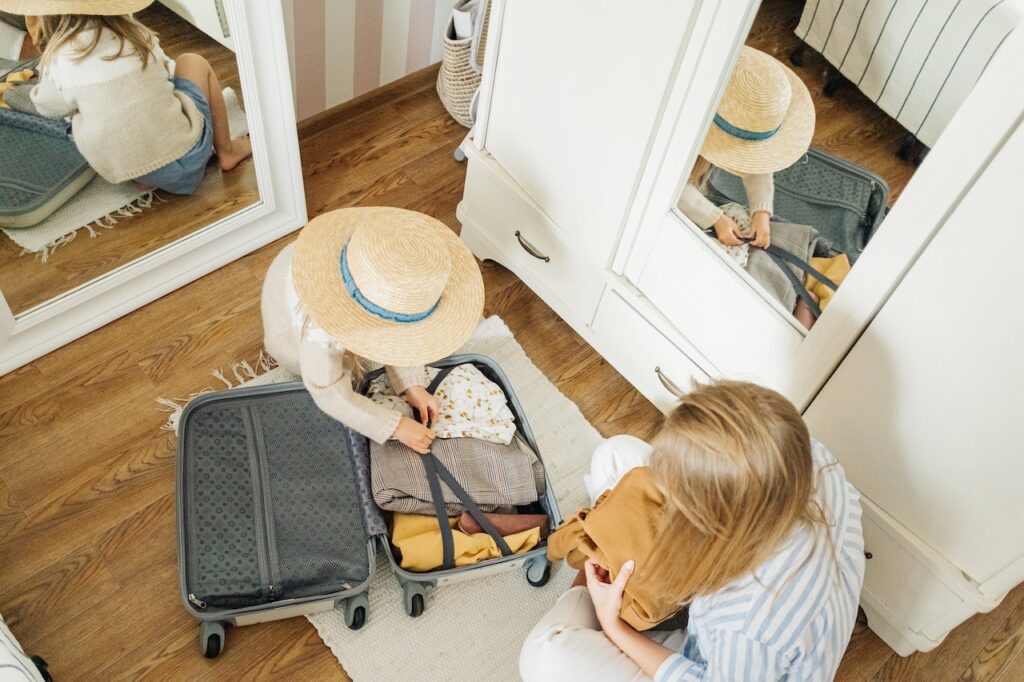Travel: Sleep Tips For Infants and Children
May 23, 2023

You want to take a vacation but then you may feel some dread around how this may affect your little one’s sleep. If so, you’re not alone. I’m sharing travel and sleep tips for infants and children today which will hopefully help you worry less and relax more on vacation!
Vacations with kids can be wonderful but often look very different than they did before kids. With vacation comes disrupted routines. You’re often in a different time zone, sleeping in a different space, having new experiences and adventures, and eating new foods. All of these things are fun and exciting but definitely take us out of our daily routine and schedules.
When you’re on vacation, you are acutely aware how important your normal structure and routine are for your children. If you go into vacation with the right mindset and realistic expectations, you will still have a wonderful time. Sleep is often one of the biggest stressors for parents of young children on vacation. Having an overtired child is harder on vacation than it is at home for many reasons.
Today, I’m sharing my top 5 sleep tips when traveling with babies or young children. I’ll also share how I recommend handling changing time zones for children.
Travel: 5 Sleep Tips For Infants And Children
#1 Respect the routine
When possible, I recommend sticking to your children’s normal bedtime and bedtime routine. As you’re able, try to make sure your baby or toddler gets an appropriate amount of sleep during naps as well. Some of these naps may be on the go and shorter than normal but do the best you can. If you’re traveling for a special occasion such as a wedding or concert, it’s okay to be flexible on your child’s normal bedtime. Just try to get back to their regular routine and bedtime the next night. In the meantime, your child may be overtired and need to play catch up during the next day or days.
#2 Make the room dark
Close the curtains, hang towels over the window or do whatever you need to keep your child’s sleep space dark. If your child is older, you may use a DreamTent or a SlumberPod to help with this. Keeping the room dark will help your child fall asleep and hopefully stay asleep longer in the morning.
#3 Mask sound
Masking sound is important and helps increase both quality and quantity of sleep. You can bring your sound machine. In a pinch, you run a fan or use an app on your phone instead.
#4 Be creative with sleeping arrangements
At home you have the perfect setup that works for your family. On vacation, you may be staying at someone else’s home, in a hotel, or camping. The sleeping arrangements may be less than ideal, but as long as you’re flexible, it should all work out. For infants and young children consider bringing or renting a Pack ‘n Play (following safe sleep guidelines of course). For older children, you can bring an air mattress. If you end up having to share a bed with your child, explain to them that this is a special situation and that rules are different than at home. Once you return home, transition back to your child’s normal sleeping arrangements. With consistency, your child’s routine should quickly return to normal.
#5 Bring comfort items from home
Since your little one will be sleeping in an unfamiliar place, I always recommend packing some comfort items from home. Consider bringing some familiar books, sheets, a sleep sack, and your sound machine. It’s ideal to keep the same bedtime routine you use at home while on vacation to maintain consistency. During the day, spend some time playing in the space near where they will be sleeping to decrease anxiety about falling asleep in a new place.
How To Handle A Change In Time Zones?
If you’re traveling somewhere in a different time zone, decide whether or not you will try to get your child onto the local time or maintain their schedule based on your time zone at home. Typically if you’re on a short trip less than 4 days, I recommend keeping them in their home time zone. If you’ll be gone more than 4 days, it may make sense to get them adjusted to the new time zone.
If you decide to have your child adjust to the new time zone, I recommend exposing them to natural light in your new location as much as you can. Try to avoid sneaky sleep if possible – aka avoid letting your little one fall asleep in little chunks here and there. And lastly, prioritize getting them to the correct bedtime as soon as possible.
If you’re planning to travel soon, fear not. With the right preparation and mindset, you can help your little one sleep well no matter you go. Above all, remember to be flexible and expect sleep to look a little different than it does at home. If you need more travel sleep tips for infants and children or helping making a plan for your child, I invite you to reach out to me.